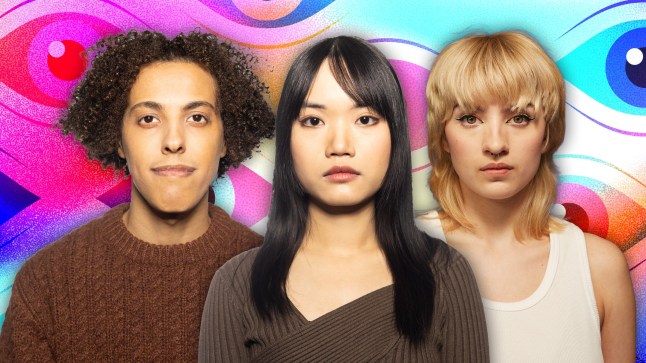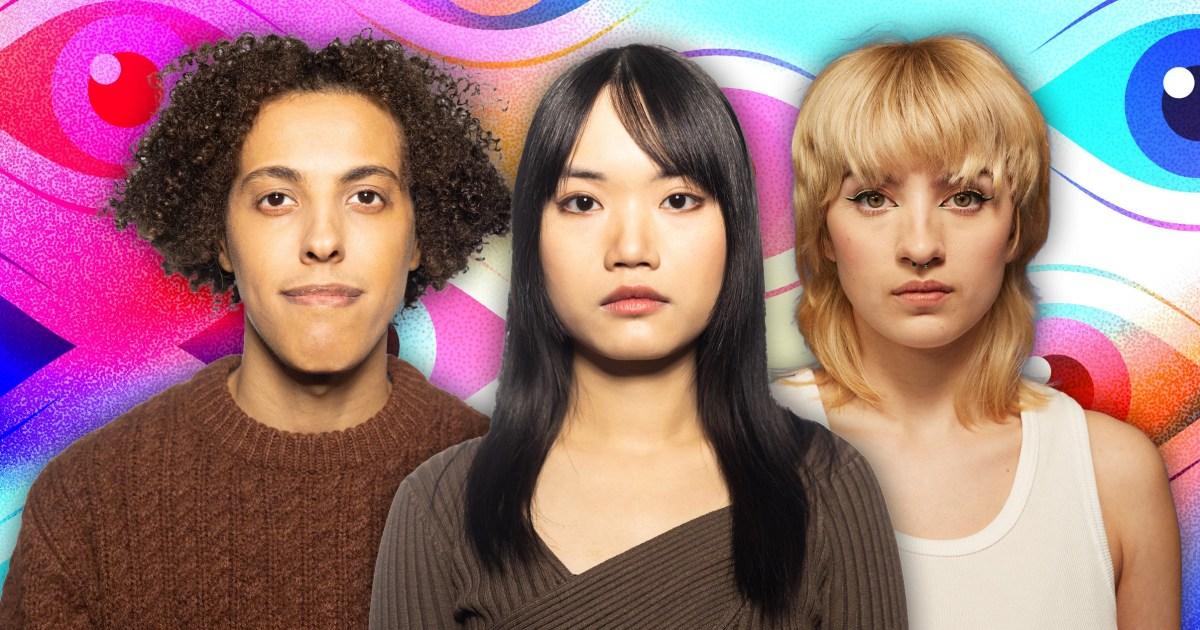
Have you spotted the Gen Z stare? (Picture: Getty/Metro)
Every now and then, TikTok coins a term for something you never even realised you’d noticed. This week, it’s the ‘Gen Z stare’.
I can’t pinpoint exactly when I first noticed twentysomethings staring blankly in response to seemingly simple questions, but when I saw Riley Despot’s video about the phenomenon, I thought yes, that looks familiar.
In her post, Riley reenacts enthusiastically making small talk with her daughter’s golf instructor, then asking clear questions about payment, only to be met with long pauses, a deadpan face and increasingly vague answers.
‘I walked away from the interaction so confused,’ she said in the caption, before adding: ‘I am against slamming a generation as a whole, because I know this isn’t all of Gen Z.’
Of course this is not universal, and for every ‘Gen Z stare’ I’ve encountered, there will be 10 times I’ve been blown away (read: downright intimidated) by the articulation of the generation coming up behind me.
But the 5,000 commenters on Riley’s video – and the thousands elsewhere on TikTok and Reddit – aren’t debating whether the Gen Z stare exists. They’re questing why this is happening, and that’s when things get interesting.
Gen Z includes anyone born between 1997 and 2012, making them between the ages of 23 and 12 when Covid-19 hit in 2020. Their formative years were defined by online learning and social isolation – and they’re still feeling the impact.
A 2024 Preply survey found the pandemic ‘particularly affected Gen Z’, with 51% saying they felt their social skills had declined because of limited in-person interactions, compared with 47% of millennials, 37% of Gen Xers and 26% for Baby Boomers.
Is it any wonder then, that small talk feels awkward?
Tam Kaur, a 24-year-old Gen Z self-help author, thinks it’s shortsighted to reduce the Gen-Z stare to rudeness, when it’s clearly a ‘symptom of something deeper’.
‘We’re the first generation to grow up with our faces constantly on display in selfies, stories, video calls, with everything being scrutinised online,’ she tells Metro.
‘That creates a heightened sense of self-consciousness and a fear of being judged, even in the smallest interactions.
‘Previous generations didn’t have to think about how they looked from every angle or whether they sounded awkward saying hello, but Gen Zs do.’
Gen Z have checked out — and maybe that’s fair
We’ve heard before that the 9 till 5 ‘isn’t worth it’ for Gen Z, who feel like career progression will do little to change crippling rents, record student debt, the gig economy and a yawning generational wealth divide.
Now, some Gen Z content creators are claiming the perceived ‘stare’ is actually a legitimate response to older customers asking younger service workers stupid or entitled questions – an extension of quiet quitting, in a way.
Previous generations might have been told to ‘respect their elders’ or show ‘the customer is always right’, but many Gen Z workers are done. So, so done.
Although some of Gen Z are (perhaps fairly) knowingly checking out, Bex Spiller, a workplace wellbeing consultant, thinks some might physically and mentally be unable to check in.
‘This Gen Z stare could actually be a symptom of burnout and cognitive overload,’ she tells Metro.
‘This generation has entered the workforce during a time of incredible pressure with rising living costs, unstable job markets and constant digital noise.
‘It’s unsurprising that this would cause their nervous system to react in a way that looks like they’re going blank or disconnecting. Like fight or flight, our nervous system also has ‘freeze’ and that could be what we’re seeing in a generation that feels overwhelmed right now.’
Bex, who is founder of The Anti-Burnout Club, says instead of mocking this social tic, we should be asking: ‘Are we about to see a generation fully burnt out before they’ve even fully entered the job market?’
In the comments, one Tiktoker, @Hazlyyyn, who works in retail, admitted she probably stares just because she’s exhausted.
‘I’m tired, I say the same things to different people every single day, I’m tired of holding convos,’ she explained. ‘Just let me answer your question and get away from me please, I’m overstimulated.’
For any members of Gen Z who’ve recognised themselves in these videos, Bex advises asking yourself what the root cause may be.
‘Do you feel like you are fully zoning out and not just eye rolling a previous generation? We’ve all done that!’ she says.
‘Start by reclaiming small pockets of rest throughout your day, protecting your energy like it’s a resource, and getting curious about what’s draining you.
‘Oh, and don’t beat yourself up for feeling fried. The world you’re trying to function in is overwhelming by design.’
When encountering the Gen Z stare, Bex urges millennials to show a bit of compassion.
‘We’ve spent decades rewarding people for being constantly “on,” but that’s just not sustainable and maybe the ‘stare’ is telling us that,’ she says.
‘Also we’ve always associated eye contact and instant replies with professionalism, but that doesn’t account for burnout, anxiety, or neurodivergence.’
Tam echoes this, advising millennials not to ‘rush to fill the silence’ if faced with an awkward pause.
‘A moment of stillness might feel awkward to you, but for some people it’s exactly the time they need to process what’s just been said. Especially for younger people who may be navigating anxiety or a lack of social confidence, that pause isn’t necessarily them being rude, it’s them trying to find their words,’ she says.
‘One of the kindest things you can do is give them space to respond. Let the silence breathe for a second. If you don’t get an answer, politely rephrasing your question in a simpler or more direct way can help ease the pressure.’
It’s hard to be mad at the Gen Z stare, if it’s borne out of social anxiety, digital overwhelm and burnout, for a generation who’ve been dealt one of the toughest hands in recent history.
And if the Gen Z stare is a sulky silent protest against the societal status quo? I say fair enough.
Maybe Gen Z has found a way to convey an emotion the rest of us wish we could.
Arrow
MORE: Size eight women are calling themselves fat in a ‘disturbing hierarchy’ of slimness
Arrow
MORE: Are millions of people actually faking being sick?
Arrow
MORE: Here’s how to deal with a big career set back
The Slice
Your free newsletter guide to the best London has on offer, from drinks deals to restaurant reviews.

